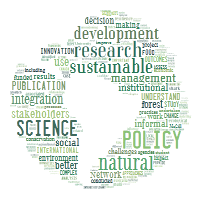Research
Our research is designed to advance sustainable natural resource management and policy through better understanding the complex interactions between social and ecological systems. My research programme is organized around three separate, but interconnected, streams:
1. Environmental Monitoring and Assessment
Despite the acknowledged complexity associated with sustainable development, it remains for society to assess, monitor and report information pertaining to changes in resource condition and the potential impacts on socio-economic values. Often the challenge is to translate scientific results into information relevant to deliberative decision-making processes. This research stream focuses on the challenge of meaningfully monitoring and assessing natural resource condition at a range of scales to support innovative impact mitigation and adaptation strategies.
2. Resilience of natural resource-dependent communities
Many parts of the world have undergone rapid environmental, social and economic transformations in recent decades. This has included increased industrialization and urbanization, higher rates of population and economic growth, and the degradation of natural assets. In this context, the sustainable natural resource management and policy challenges facing government are becoming increasingly complex, adaptive and ‘messy’. Ultimately the resilience of any socio-ecological system is a function of the social actors and institutions involved in governing resource use and stewardship. This stream embraces exploratory and inter-disciplinary research approaches to deliver integrative insights that are applicable to the decision-making challenges being considered.
3. Innovation, sustainability and public policy
The relationship between science and decision-making is central to any effort to progress sustainable development. Indeed, recent science-policy debates have emphasized a growing role for science in helping to address some of society's most pressing environmental challenges. However, improving scientific input into the development of public policy represents a significant and complex challenge. Much of the recent literature on this topic suggests that key to addressing this challenge is to identify ways to improve engagement between scientists, communities and decision-makers through communication and collaboration, ultimately making science more democratic and relevant to policy-making. This research stream questions the ways we approach complex and adaptive environmental challenges; how we collaborate, co-learn, and integrate knowledge to innovate for sustainable development outcomes.
